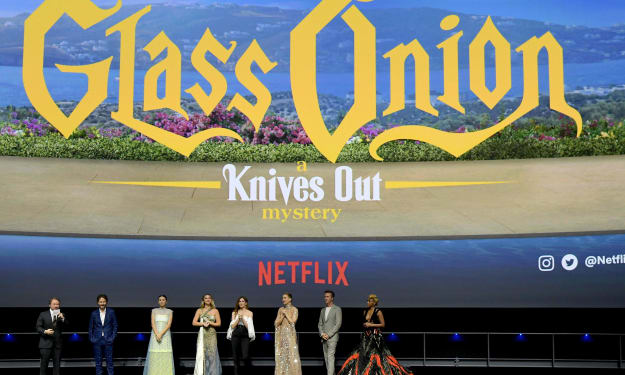The Environmentalist Message at the Heart of Disney's 'Strange World'
Disney, DeGrowth, sustainability, and changing the world.

Disney's Strange World is about a fantastical land entirely different from our own, filled with fantastic locals and strange creatures. A central throughline in the film, like most Disney properties, is about familial expectations. The explorer Jaeger Clade wants his son Searcher to follow in his footsteps and find a way over the impassable mountain chain surrounding their country of Avalonia. This expectation causes a rift in Jaeger and Searcher's relationship that continues into the present.
Twenty-five years later, Searcher, although trying to move beyond this toxic dynamic, finds himself pushing his son, Ethan Clade, to be a farmer. This dysfunctional family of explorers and farmers is thrust into an adventure to go underneath the mountains to explore an even stranger world (a la Journey to the Center of the Earth) to find a way to save Avalonia, all while balancing out their deeper interpersonal issues.
Family is everywhere in this film, yet a theme that is just as present, though it might get less attention, is how this film handles conservation. Environmentalism is a constant in Strange World. A surprising lesson is how we must handle ecological instability. The film suggests that our answer lies not with techno-utopianism or machismo but with a better balance with the natural world, even if it means forgoing the technology central to our current way of life.
An environmentalist reading
In the film, a significant plot point is that Avalonia advanced rapidly after discovering a plant called Pando: a crop that produces a harvestable energy source that now powers their machines. Because of Pando, Avalonia went from using horse-and-buggies to having floating hover ships, radio, and endless electricity.
It's fair to say that Pando is a pretty good analogy for carbon-based power sources such as oil, especially after we learn that it's detrimental to the ecosystem. Though not initially known to Avalonia, Pando is a parasite destroying the interior of the turtle-like body they all live on top of. It is not dying but redirecting its energy to stop the creature's immune response from killing it off — dooming everyone in the process.
Like with Avalonia, our planet advanced rapidly after we learned to burn carbon to power our machinery. We went from an animal-powered society to one that had electricity running through billions of homes across the planet, and this development is deteriorating our atmosphere. Man-powered climate change is making our lives more difficult, and the next decade will be filled with immense tribulations as a result.
The movie critiques leaders who are unwilling to assess their impact on the environment. Callisto Mal, leader of Avalonia, invites the Clade family on a mission into a sinkhole where she believes Pando roots, which we learn are part of one single organism, are coming from. The way Callisto is introduced makes it clear that she does not care about the environment. Her hulking ship lands on the Clade family's crops, and she does not bother to move it. It’s a small but clever way to signal to the audience that Avalonian society values technology over its environment.
Once the Avalonian mission realizes that the roots of Pando are coming from a strange Dr. Seus-esque world beneath them, Callisto and Searcher don't care to figure out how Pando interacts with this environment or even what this environment means for their country above it. Their only concern is to stop the harm being done to the Pando root system so their technology can keep running, assuming that the flora and fauna around them are pests to be dealt with.
This singular focus on a technological solution is portrayed as a reflection of the grandfather's machismo. Where Jaeger Clade wants to treat every problem with brute force, Searcher and Callisto treat every problem just as simplistically, with technology. We see this when Ethan asks both of them to play a D&D-inspired game called Primal Outpost, and the two patriarchs cannot understand the game's premise, which is working in harmony with nature. They only want to keep doing what they know without stopping to assess their effects, and the son rightfully gets frustrated by them both, depicting them as two sides of the same coin.
The father's techno-utopianism (he literally calls Avalonia a utopia, that's not me reading into it) is very similar to the net-zero approach to climate change mitigation, or the idea that we work on removing our total carbon emissions down to zero, rather than scaling down capitalist production. Often these models require adopting some undeveloped technology that will magically remove carbon from the atmosphere and stop the problem of climate change, while changing as little as possible about our current economy.
Strange Worlds seems to suggest that this approach to environmentalism is naive. You cannot continue to engage in behavior that damages your environment and expect different results. Society's behavior has to change too, and the film's climax involves our characters switching their objectives and killing Pando (the metaphor for carbon-powered fuel) so the turtle-like ecosystem they live on can continue to survive.
And as a result, there are consequences. Their technology seems to regress. People aren't navigating Pando-powered hover ships by the film's end but using kinetic energy, air-powered floatation, and horse and buggy. They have to reinvent electricity by using a wind-powered device built out of the husk of the explorer vehicle we see throughout the film.
This moral is one of degrowth or the political concept that we need to shrink the economy to conserve our environment rather than expecting it to increase forever. The film is saying that our conception of technological progress must take a back seat to sustainability. This message is a refreshing, if not hypocritical position to have from a firm that produces millions of tonnes of carbon annually.
A Shrinking Conclusion
All in all, Stange World was a treat to watch. There were other themes and premises I didn't have time to get into, such as the character Ethan's queerness or his mom Meridian Clade being a total badass, which I encourage you to check out for yourself.
The central message that the people of Avalonia needed to slow their unstainable technological growth to preserve their future truly captivated me. We are a society that is pushing for increased energy consumption to the point of insanity, hoping that fusion, renewables, and carbon capture will lead us to some post-climate change promised land without having to make any sacrifices at all.
It's refreshing to see a film bucking that trend, encouraging not some far-off techno-saviorism but behaviors we can adopt in the here and now.
About the Creator
Alex Mell-Taylor
I write long-form pieces on timely themes inside entertainment, pop culture, video games, gender, sexuality, race and politics. My writing currently reaches a growing audience of over 10,000 people every month across various publications.






Comments
There are no comments for this story
Be the first to respond and start the conversation.